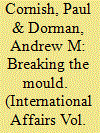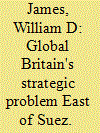|
|
|
Sort Order |
|
|
|
Items / Page
|
|
|
|
|
|
|
| Srl | Item |
| 1 |
ID:
095069


|
|
|
|
|
| Publication |
2010.
|
| Summary/Abstract |
With a strategic defence review expected to begin in 2010, this article reflects upon the history of the review in British defence policy and planning. The authors argue that for decades successive defence reviews have followed a process in which policy development moves through four phases: failure, inertia, formulation and misimplementation. This has resulted in a cycle of defence reviews that have proved to be incomplete and unsustainable: a cycle in which each review leaves so much unfinished business that another radical reappraisal of defence policy is soon thought necessary, and a cycle from which a succession of governments have so far proved unable or unwilling to escape. The article suggests that the strategic defence (and security) review promised for the next parliament is in danger of continuing this pattern of policy deficiency. The authors contest that this need not be the case. With a close understanding of the pattern of past reviews it should be possible for the 2010 review finally to break the mould and produce a coherent and above all sustainable defence policy and strategy.
|
|
|
|
|
|
|
|
|
|
|
|
|
|
|
|
| 2 |
ID:
104151


|
|
|
| 3 |
ID:
141732


|
|
|
|
|
| Summary/Abstract |
This article investigates the Franco-British rapprochement in security and defence cooperation under Nicolas Sarkozy, Gordon Brown and David Cameron from 2008 to 2012. While in the past British Atlanticism and the French Europeanist tradition had stood in the way of close bilateral cooperation, the conclusion of several treaties of defence cooperation in this period delivered closer ties. By adopting an interpretivist perspective on events, this article argues that the rapprochement can be explained with reference principally to changes in the French tradition, which took it closer to the British Atlanticist tradition. Drawing on parliamentary and executive statements, the article traces the influence of, and changes in, the balance between Europeanism and Atlanticism in the defence policy traditions in the two countries. The article argues that the dilemmas that compelled a revision of the traditions particularly in France arose from a series of new beliefs at elite level about sovereignty over defence policy, national role conceptions and the recognition of dire budgetary constraints. In this context, Franco-British rapprochement served both countries’ national interests.
|
|
|
|
|
|
|
|
|
|
|
|
|
|
|
|
| 4 |
ID:
156453


|
|
|
| 5 |
ID:
178501


|
|
|
|
|
| Summary/Abstract |
Why did Britain withdraw from its military bases in the Arabian Peninsula and Southeast Asia midway through the Cold War? Existing accounts tend to focus on Britain's weak economic position, as well as the domestic political incentives of retrenchment for the ruling Labour Party. This article offers an alternative explanation: the strategic rationale for retaining a permanent presence East of Suez dissolved during the 1960s, as policymakers realised that these military bases were consuming more security than they could generate. These findings have resonance for British officials charting a return East of Suez today under the banner of ‘Global Britain’.
|
|
|
|
|
|
|
|
|
|
|
|
|
|
|
|
| 6 |
ID:
120419


|
|
|
|
|
| Publication |
2013.
|
| Summary/Abstract |
Professor Kathleen Burk has worked on some of the key themes in the history of diplomacy for more than three decades. Foremost amongst them has been the role of financial strength in the projection of power, and other key themes have included the role of the individual in making state policy; the concept and practice of "imperialism"; and the importance of non-state actors, such as banks, businessmen, and even tourists in the interplay between nations. As this article demonstrates, she has attempted throughout to strike a historiographical balance, moved more by her empirical sense of the evidence than the fashions that have come and gone during her career. She worked on transatlantic relations before "Atlantic History" came to the fore; transnationalism before the movement of ideas across frontiers became an obsession; and imperialism before the recent recrudescence of interest in this arena too. In this special issue of Diplomacy and Statecraft, Professor Burk's former colleagues, collaborators, and pupils demonstrate how they have adopted and adapted her techniques: from the history of decolonisation to histories of charities to human rights, and covering topics as diverse as British defence policy and twentieth century Americans' concepts of what "Europe" is or might become.
|
|
|
|
|
|
|
|
|
|
|
|
|
|
|
|
| 7 |
ID:
156480


|
|
|
| 8 |
ID:
153839


|
|
|
|
|
| Summary/Abstract |
The article looks at the rise of India from UK perspectives, a rise and response which are driven by economics. Five themes are pursued, namely the pre-2002 legacy of the past, the 2002–2016 developing partnership, the politics of the current relationship, the economics of the relationship, and the post-Brexit future. With regard to the pre-2002 legacy of the past there is the colonial legacy that both draws the two countries together, yet also leaves friction points of perspectives and sensitivities. The 2002–2016 developing partnership deals with the progress and process of UK–India links during the Blair, Brown and Cameron periods. With regard to the current economics of the relationship, India's economics-driven rise made it a potential magnet for British exports and for two-way investments, and an alternative to China for the UK. With regard to the current politics of the relationship, the disappearance of the Soviet Union had left the way for convergence of two English speaking liberal democracies, who share important anti-terrorism and anti-jihadism concerns. However, while trade has increased between the UK and India, its volume level has not met expectations, and UK exports have lagged back, thereby leaving a growing trade deficit. Future UK–India relations are dramatically being reshaped by the Brexit referendum vote for the UK to leave the EU, and with it the prospects of a UK–India Free Trade Agreement being negotiated. However, while the economics and politics of the relationship make India increasingly important to the UK, it leaves the UK of secondary importance to India.
|
|
|
|
|
|
|
|
|
|
|
|
|
|
|
|
| 9 |
ID:
139205


|
|
|
|
|
| Summary/Abstract |
This paper uses the strategic dimensions concept and content analysis of nine key defence white papers published between 1957 and 2010 to assess which factors most influence declaratory policy. The paper also notes that the development of defence policy has been accompanied by the “muddling through” vs. decisive choice debate which reflects the tensions within policy between the thesis of strategy and the antithesis of fiscal parsimony. The paper maintains that defence policy is ultimately contingent upon external threats and it is these, rather than the desire to economise, which are the key policy drivers. It concludes that this extrinsic factor will determine the outcome of the next SDSR and though this is not necessarily incongruent with the desire to economise, events may prove otherwise.
|
|
|
|
|
|
|
|
|
|
|
|
|
|
|
|
| 10 |
ID:
100629


|
|
|
|
|
| Publication |
2010.
|
| Summary/Abstract |
Much attention on the Strategic Defence and Security Review focused on the issues of deterrence and inter-service rivalry. But a number of other important choices, not obviously apparent in the document, might instead suggest the direction in which British defence policy has evolved. The outcome may be affordable, but is it at the cost of shortterm coherence?
|
|
|
|
|
|
|
|
|
|
|
|
|
|
|
|
|
|
|
|
|